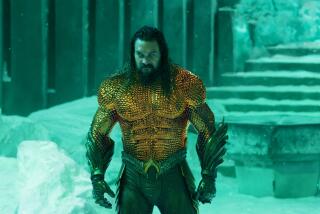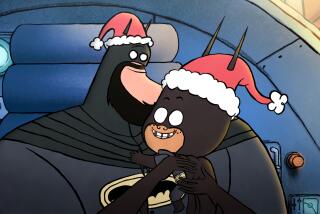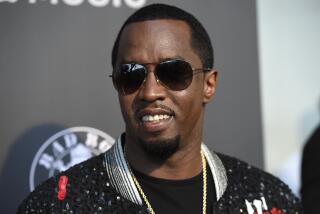Analysis: In the superhero movie arms race, has Warner Bros. created too bleak a world in ‘Batman v Superman’?
Warner Bros.’ flag-planting franchise starter “Batman v Superman: Dawn of Justice” was either the most anticipated movie of the year or one of the most dreaded.
The idea of seeing DC Comics’ “trinity” of characters — Batman, Superman and Wonder Woman — on the screen together is certainly a thing pop-culture dreams are made of. And audiences clearly want a piece of that dream: “BvS” grossed $170.1 million its first weekend in theaters, a record-breaking opening for a March film and the sixth-largest domestic opening ever.
Critics, however, have teed off on the film: An increasingly rare few, like The Times’ Kenneth Turan, were positive on director Zack Snyder’s film, but others were far less so. (Rotten Tomatoes, which aggregates critical response, has it at 29% — in comparison, Marvel’s “The Avengers” from 2012 holds a 92% rating.) The dominant theme from the negative responses is that Snyder’s take on the DC Comics Extended Universe, introduced in his “Man of Steel” in 2013, is unrelentingly dark, pummeling, brutal.
It raises the question: How much darkness do audiences want? And has Warner Bros. painted itself into a tonal corner, where everything feels like the inside of a goth kid’s journal?
Of course, visiting Gotham City is supposed to be a bleak affair. It is, as well established by DC Comics, the embodiment of urban blight, a city where the sun never shines, no matter what time it is. It’s the kind of city that would give birth to a hero like Batman — dark, twisted, born of murder and mayhem, possibly insane. It is also inherently cinematic, which helps explain why Christopher Nolan — a filmmaker steeped in noir sensibilities — was drawn to it. Nolan’s hyper-real Batman trilogy — “Batman Begins,” “The Dark Knight” and “The Dark Knight Rises “ — is the most successful collection of comic book movies Warner Bros. has ever made, grossing $2.6 billion worldwide.
When Warner Bros. decided to relaunch Superman — the universally acknowledged first superhero, the big blue schoolboy who stands for truth, justice and the American Way — it turned to Nolan, as he clearly had the Midas touch. Understandably tired of putting heroes through their paces, Nolan agreed to executive produce the movie that would become 2013’s “Man of Steel” and help guide the filmmaker who would ultimately end up directing it: Snyder, who broke through with 2004’s “Dawn of the Dead,” broke big with 2006’s “300,” and, some would say, fell flat with 2009’s “Watchmen” and 2011’s “Sucker Punch.” But Warner Bros. likes Snyder, and with Nolan as a tonal godfather, the studio let him loose on Metropolis.
Unlike Gotham, though, Metropolis is supposed to be a gleaming city of glass and steel and hope, and its hero — an immigrant from another world, raised in the bosom of America by the salt of the Kansas earth and in Metropolis to work for its greatest newspaper — is a symbol for the potential of humanity. Superman is supposed to be the best of us, because he believes in the best in us.
But to give us a Superman that might actually exist in our world, much like the Batman that had to wrestle with things like gravity, slipped discs and hostile takeovers, Snyder and Nolan gave us a Man of Steel who seemed to be OK with being party to the destruction of both Smallville and Metropolis.
Henry Cavill’s Clark Kent was raised by parents who taught him to hide his gifts, even if lives were at stake, rather than expose himself to the world. Snyder gave us a Superman that would kill. (He also, in “Batman v Superman,” offers us a Dark Knight who has no problem with branding some of his victims with a hot iron and riddling others with bullets, a thing the comic book version of Batman would never do.)

After Marvel conquered the world with its cinematic universe — which began with 2008’s “Iron Man” and a dozen movies later, has grossed $9 billion worldwide — DC and Warner Bros. decided they needed their own Avengers-like franchise and wanted Snyder, whose “Man of Steel” grossed $668 million worldwide, to make it for them. Hence “Batman v Superman: Dawn of Justice,” the “justice” being a not-at-all subtle nod to DC’s Justice League, the superhero team that consists of Superman, Batman, Wonder Woman, the Flash, Aquaman and Cyborg.
Judging by the tone of “Batman v Superman,” each of these films will likely have the same apocalyptic, almost funereal feel.
In contrast, the tone of Marvel movies is “fun,” which is what allows it to make World War II romps (“Captain America: The First Avenger”), heist comedies (“Ant-Man”), conspiracy thrillers (“Captain America: The Winter Soldier”), space operas (“Guardians of the Galaxy”) and episodes of “The Rockford Files” with more explosions (“Iron Man 3”). Marvel has built a framework in which anything can happen and audiences won’t blink.
Warner Bros.’ framework posits that only real things can happen. Its tone is “gravitas,” which means that no hero can crack a joke; the only smiles to be seen take place either before or after punching someone or something in the face. The rare shaft of sunlight is spotted during a daytime funeral.
That’s also something of a stark contrast from DC’s own television universe, where “The Flash” — which mixes its angst with levity, its heartbreak with heartfelt — is the CW’s highest-rated show. And CBS’ “Supergirl” is treating Superman’s cousin the way the new movies seem disinclined to.
During the press siege for “Batman v Superman,” Snyder was asked why TV’s Flash, Grant Gustin, wasn’t right for the superhero universe he’s building (Snyder will soon start shooting the two-part “Justice League”), and the filmmaker talked about how he didn’t think the Flash was a good fit, that the tone was “not our world.”
“Batman v Superman: Dawn of Justice” is a hit, no two ways about it. And to be fair, Warner Bros. was committed to its ambitious movie plan (“Batman v Superman,” August’s “Suicide Squad,” 2017’s “Wonder Woman” and “The Justice League Part One,” 2018’s “The Flash” and “Aquaman,” 2019’s “Shazam!” and “Justice League Part Two,” and 2020’s “Cyborg” and “Green Lantern”) before “BvS” even hit theaters. We are in a superhero-movie arms race, and Warner Bros. needs to field its army.
But if your army is all infantry, or all snipers, or all tanks, you’ll lose the war. And Warner Bros. seems to be betting victory on a roll of the dice where every side has the same number on it.
MORE:
‘Batman v Superman’ breaks a box-office record for best pre-summer debut
Here come virtual-reality headsets — are they game changers?
What Wonder Woman experts had to say about ‘Batman v Superman’s’ Diana Prince
DC bets big on Rebirth: A re-centering of characters, and the Joker’s real name
More to Read
Only good movies
Get the Indie Focus newsletter, Mark Olsen's weekly guide to the world of cinema.
You may occasionally receive promotional content from the Los Angeles Times.







